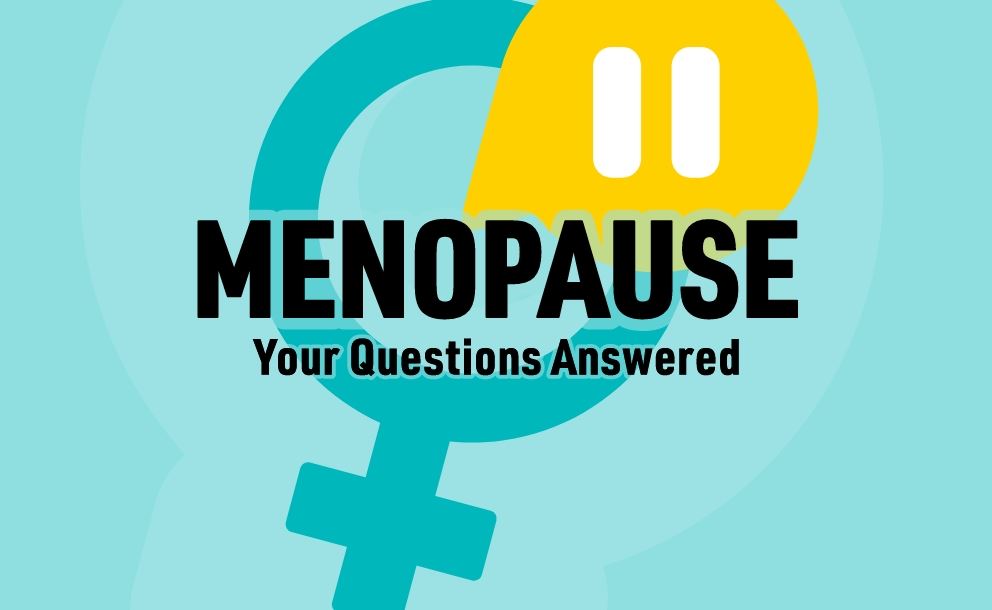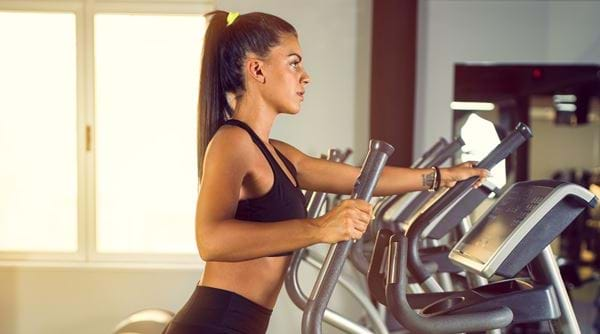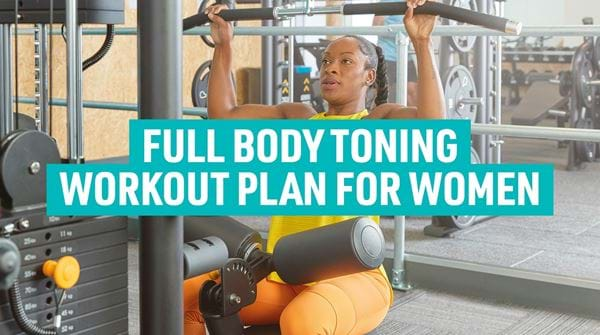Exercise, nutrition, and the menopause: Your questions answered

The menopause is a natural and healthy part of the ageing process for some women, yet it is something that is often feared or looked upon negatively.
Even though most women will experience the menopause at some point in their life, we are often left in the dark about what it entails. This makes the process more confusing and scarier than it needs to be, and can result in women trying fad diets, extreme detoxes, and engaging in unhealthy behaviours to reduce symptoms.
We’re here to help you navigate the menopause, so you are prepared for any physical and mental changes that might occur as the result of fluctuating hormones. Sports & Exercise Nutritionist Beth Trueman is answering some common questions around diet, exercise, and the menopause, including looking at whether food and exercise can help to reduce menopause symptoms.
We’ve also worked with Dr Sarah Hattam to help you learn how to ease menopause symptoms.
What is Menopause and how does it affect your body?
The menopause is a natural part of the ageing process which is caused by a change in the balance of your hormones. The term describes when a woman has stopped having a period and is no longer able to get pregnant naturally.
There are three key stages in the menopause transition:
-
Perimenopause
-
Menopause
-
Post-Menopause
Perimenopause: In the years leading up to the menopause, you go through the menopause transition, also known as perimenopause. During this time, hormones start to fluctuate and many women experience changes in their monthly cycles, hot flushes, or other symptoms. This often begins between the ages of 45 and 55 and can start months, or even years before menopause begins.
Menopause: You reach menopause when you have gone 12 consecutive months without a menstrual period. Once this has occurred, you enter post-menopause.
Post-Menopause: During post-menopause, your menopausal symptoms should start to ease. Your hormone levels will remain low (both oestrogen and progesterone) and you’ll stay in this stage for the rest of your life.
How long does menopause last?
The perimenopause starts when your hormones start to fluctuate and can last anywhere from a few months, to a few years. During the perimenopause, you might notice changes to your cycle; if it's been 12 consecutive months without a period, you've entered the menopause stage. After the 12 months, you've reached the post-menopause stage. Symptoms start to ease off here, but can still last up to four years.
What are some of the most common symptoms during menopause?
There are lots of different symptoms you may experience when going through the menopausal transition, but this can vary from person to person. Some common symptoms are:
-
Hot flushes
-
Disrupted sleep
-
Night sweats
-
Headaches
-
Tiredness and fatigue
-
Vaginal dryness
-
A reduced libido
-
Headaches
-
Palpitations
-
Changes in mood
-
Joint stiffness
-
Weak bones
-
Weight gain

What are the benefits of staying active during menopause?
Staying active during menopause has many physical and mental benefits, including reducing some menopausal symptoms. Exercising during the menopause can help to:
-
Reduce the intensity of hot flushes and night sweats
Getting enough sleep is an important part of managing multiple menopausal symptoms, but it is often disrupted by hot flushes and night sweats. One study found that those who exercised during menopause experienced reduced frequency and intensity of hot flushes in comparison to those who were inactive.
-
Improve your bone strength and reduce risk of osteoporosis
As you age, your bone strength naturally starts to decrease. When you go through the menopause, your oestrogen levels start to drop more dramatically, and this is directly linked to a decrease in bone density. This increases your risk of developing osteoporosis and increases your risk of bone breakage. Staying active and exercising regularly can help to maintain and improve your bone density, while also helping to improve your strength and balance which can reduce your risk of falling.
-
Maintain muscle mass
As a result of the drop of oestrogen in the body during the menopausal phases, many women experience a faster decrease of muscle mass during the menopausal stages, and for up to two years after. Regular exercise, particularly resistance exercise, can help to preserve muscle mass.
-
Prevent excessive weight gain
As a result of the drop of oestrogen in the body during the menopausal phases, many women find they start to gain weight, particularly more abdominal fat. Staying active is a great way to help manage your weight in combination with a healthy balanced diet.
-
Look after your heart health
During menopause, your oestrogen levels drop which increases the risk of the coronary arteries narrowing. This can happen because oestrogen helps to control your cholesterol levels and reduces the risk of fatty plaque building up. As a result, having lower oestrogen levels can increase your risk of having a heart attack or a stroke. Exercising can help to look after your heart health by strengthening your heart, improving your blood pressure, and reducing your overall risk.
-
Boosts your mood
During menopause, hormonal fluctuations can influence the way you feel and think. Some women may experience increased fatigue, irritability, and low mood during the menopausal stages and exercise has been shown to release endorphins, a feel-good hormone that boosts your mood. If you don’t feel like exercising, a walk outdoors has also been shown naturally increase the release of serotonin, a hormone that can boost your mood and help you feel calm and focused.

How do I stay fit during and after the menopause?
It’s recommended that we all aim to do strengthening activities that work all major muscle groups on at least 2 days per week, as well as, 150 minutes of moderate-intensity aerobic activity or 75 minutes of vigorous-intensity aerobic activity per week. But any movement is a great place to start - small steps add up to big change!
You may not always feel up for exercising, so be kind to yourself and remember that movement is movement. It doesn’t have to be a sweaty high intensity workout to count - a gentle walk, a slow yoga flow or a boogie in your kitchen to your favourite album are all great ways to get moving.
Remember to get plenty of rest and recovery between your workouts too. During the menopause transition, your hormonal changes will be putting stress on your nervous system (adrenals). Exercising without adequate recovery can add to this and leave your body exhausted.
How does menopause contribute to weight gain?
Unfortunately, the hormonal changes associated with menopause can make you much more likely to gain weight, and it’s typically associated with weight that is distributed around your tummy.
As you age, you are more likely to gain weight in general, and the lifestyle factors which are often a result of menopausal symptoms, such as lack of quality sleep and lack of exercise, can further contribute to unintentional weight gain.
Just know that there are ways to manage menopause-related weight gain if you feel it is having a negative impact on your mental and physical health and wellbeing.
What are the best exercises to lose weight during and after the menopause?
Losing weight during or after the menopause may feel impossible when you’ve got hormonal changes, stress and the natural aging process working against you.
Although there isn’t one magic exercise to lose weight during menopause, general movement and gentle exercise can all help to manage your weight, especially when combined with a healthy balanced diet.
Where possible, it’s recommended to include a combination of resistance training (to maintain muscle mass) and aerobic exercise (to help reduce abdominal fat) into your week. Having a combination will help you to see greater results, while also preserving muscle mass during weight loss and helping to improve bone density too.

Can certain foods help during the menopause?
Although no food will completely stop menopause symptoms, there is some evidence that certain foods can help to relieve some symptoms and side effects such as hot flushes, poor sleep quality and low bone density.
If you’re experiencing menopause, try to:
-
Include foods in your diet that are rich in calcium
The decline in oestrogen during menopause can increase your risk of osteoporosis. Consuming foods rich in calcium such as milk, yoghurt and cheese can help to strengthen your bones.
-
Increase your intake of healthy fats
Try to include at least one serving of oily fish in your diet, such as salmon or mackerel. Oily fish is rich in unsaturated fats and omega-3 fats which can help to look after your heart health and brain functioning.
-
Reduce your intake of saturated fat
You’re more at risk of high cholesterol during menopause, so where possible, try to cut back on your saturated fat intake. You can do this with some simple swaps, such as opting for leaner cuts of meats, cutting back on processed meats like bacon and sausages and have sweet treats like cakes and biscuits less frequently.
-
Eat enough protein
Protein helps to build and maintain muscle mass, which naturally will start to decrease during the menopausal period. You’re also much more likely to lose muscle mass when in a calorie deficit, so if you’re trying to lose weight during menopause, make sure to try and include a source of protein with your meals.
-
Include foods rich in iron
Eating enough iron can help to combat the tiredness and fatigue that you may feel during menopause. You can get this through lean red meat, fortified cereals, kidney beans, lentils, leafy greens and some nuts and seeds.
It’s very unlikely you’ll need to take an iron supplement during menopause, as once you reach menopause your iron need drops, and most women can get enough iron through a healthy balanced diet. Please speak to your doctor or specialist if you are unsure.
-
Cut back on caffeine
Although reaching for a coffee might be your morning ritual or a lunchtime pick-me-up, some research has shown that caffeine may be making menopausal symptoms such as hot flushes worse. There is conflicting evidence though, so don't feel like you have to ditch all your coffee straight away. But it's worth considering that cutting back on caffeine or switching to decaf options could have some, if only small, impact on reducing your menopausal symptoms.
For some women, the menopause is a complete breeze, so there’s no need to pre-emptively worry about how it will affect your life until it happens. Maintaining a healthy lifestyle can help manage uncomfortable symptoms, as well as manage your weight and prevent bone loss. Exercising in your 50s and beyond can also help to prevent your strength and balance deteriorating as you get older.
Ready to get started? Find your nearest PureGym and join today.


